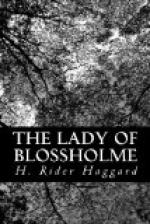“Have you been waiting to see the moon rise?” asked Sir John, glancing at Christopher from beneath his shaggy eyebrows as he returned.
“Nay, sir, but the passages in this old house of yours are most wondrous long, and I took a wrong turn in threading them.”
“Oh!” said Sir John. “Well, you have a talent for wrong turns, and such partings are hard. Now, do you understand that this is the last of them?”
“I understand that you may say so, sir.”
“And that I mean it, too, I hope. Listen, Christopher,” he added, with earnestness, but in a kindly voice. “Believe me, I like you well, and would not give you pain, or the maid yonder, if I could help it. Yet I have no choice. I am threatened on all sides by priest and king, and you have lost your heritage. She is the only jewel that I can pawn, and for your own safety’s sake and her children’s sake, must marry well. Yonder Despard will not live long, he drinks too hard; and then your day may come, if you still care for his leavings—perhaps in two years, perhaps in less, for she will soon see him out. Now, let us talk no more of the matter, but if aught befalls me, be a friend to her. Here comes the liquor—drink it up and be off. Though I seem rough with you, my hope is that you may quaff many another cup at Shefton.”
It was seven o’clock of the next morning, and Sir John, having eaten his breakfast, was girding on his sword—for Jeffrey had already gone to fetch the horses—when the door opened and his daughter entered the great hall, candle in hand, wrapped in a fur cloak, over which her long hair fell. Glancing at her, Sir John noted that her eyes were wide and frightened.
“What is it now, girl?” he asked. “You’ll take your death of cold among these draughts.”
“Oh! father,” she said, kissing him, “I came to bid you farewell, and—and—to pray you not to start.”
“Not to start? And why?”
“Because, father, I have dreamed a bad dream. At first last night I could not sleep, and when at length I did I dreamed that dream thrice,” and she paused.
“Go on, Cicely; I am not afraid of dreams, which are but foolishness—coming from the stomach.”
“Mayhap; yet, father, it was so plain and clear I can scarcely bear to tell it to you. I stood in a dark place amidst black things that I knew to be trees. Then the red dawn broke upon the snow, and I saw a little pool with brown rushes frozen in its ice. And there—there, at the edge of the pool, by a pollard willow with one white limb, you lay, your bare sword in your hand and an arrow in your neck, shot from behind, while in the trunk of the willow were other arrows, and lying near you two slain. Then cloaked men came as though to carry them away, and I awoke. I say I dreamed it thrice.”
“A jolly good morrow indeed,” said Sir John, turning a shade paler. “And now, daughter, what do you make of this business?”




